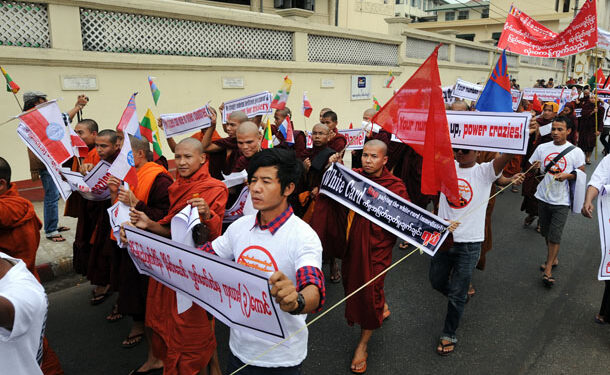RANGOON — The Arakan State government’s ongoing citizenship verification process has caused disquiet among local Arakanese, some of whom contend that immigration officials are overly accommodating of unwarranted claims.
The citizenship verification process, a largely ill-defined scheme that involves non-nationals providing proof of Burma-born ancestry, has led to several disputes with protesting Arakanese in northern Arakan State, according to Soe Naing, district officer for immigration and population in Buthidaung Township.
“We are trying to issue [national registration cards] in accordance with the 1982 [citizenship] law but local people argue with us. We explain the process to them but they don’t accept it,” he told The Irrawaddy.
“If they want to change it, the law would have to be amended. But that’s not our responsibility; all we do is obey the law.”
The ongoing citizenship verification drive follows the government’s decision to invalidate the temporary identification documents known as “white cards” earlier this year, disenfranchising up to 800,000 people nationwide.
Most holders of the now defunct form of identification are Rohingya, a persecuted Muslim minority of around 1 million people in Arakan State that the government refers to as “Bengali” to imply their status as illegal immigrants.
The vast majority of Rohingya are effectively denied citizenship under Burma’s widely criticized 1982 citizenship law which states that only recognized ethnic nationalities and others that settled in the county before 1823 are automatically entitled to Burmese citizenship.
The law also outlines two additional categories of citizens: associate citizens and naturalized citizens. Persons may be eligible under the former category if they qualified for citizenship under the previous 1948 citizenship law.
Persons may be able to apply for naturalized citizenship by providing “conclusive evidence” that he/she or his/her parents resided in Burma prior to January 4, 1948—the date of Burma’s independence.
According to Soe Naing, Rohingya applicants can apply for citizenship and a national registration card if they can prove the required background, with proper documentation, in accordance with the 1982 act.
Past nationality verification schemes in the state have been controversial, with local officials, often accompanied by police, requesting that families register as “Bengali” or be disqualified from the process.
Khin Maung Than of the Arakan National Party (ANP), a major political party advocating for the interests of ethnic Arakanese, said the immigration department was examining the nationality claims of “Bengalis” with particular attention paid to Article 6 of the 1982 law which states that, “A person who is already a citizen on the date this Law comes into force is a citizen.”
The ANP member expressed dissatisfaction with the verification process, claiming it was too accepting of underserving claims.
Emphasis on Article 6 had created consternation among local Arakanese, according to another ANP official, Aung Mra Kyaw, who queried whether immigration officials were assessing citizenship claims vis-à-vis Burma’s previous 1948 law.
Aung Mra Kyaw said that since the former law was now abolished it should not be referred to during the verification process.
However, Htun Aung Thein, an ANP official who is participating in the verification process, said that most Rohingya would not be eligible for citizenship anyway as they were unable to provide the relevant documents to indicate proof of ancestry.
“The majority of Bengali people are not interested in getting citizenship,” he said. “[And] they want to use the name Rohingya.”
Moe Hein, a director in the Arakan State government’s head office, declined to comment on the issues raised when contacted by The Irrawaddy on Friday and referred queries to the state’s public relations department.
The state government’s information department director Hla Thein told The Irrawaddy he had heard of complaints over the verification process and would comment on the matter at a later date.

















